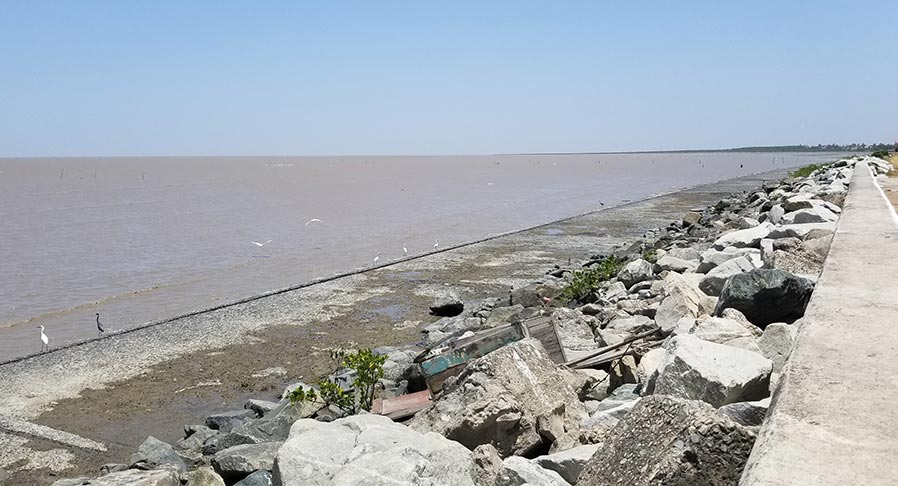UCLA Executive MBAs Optimize Funding Strategy to Restore a Vital Natural Resource
UCLA Executive MBAs Optimize Funding Strategy to Restore a Vital Natural Resource

Yandro Valdez compared black mangroves to red and white mangrove trees during a tour organized by CI-Suriname and local ecotourism guide Anvil Woode | EMBAs Eden Dahan and Yandro Valdez (center and right) with Tjitrodipo Kayleigh (left), representing CI-Suriname
It’s clear-cut: Protecting mangroves is crucial to improving coastal resilience in Guyana and Suriname.
Our field study team was engaged by global environmental conservation nonprofit Conservation International to establish an optimal funding mechanism for the conservation and restoration of the mangroves in both countries.
CI’s mission is best captured in its tagline: “Nature doesn’t need people. People need nature.” CI projects have collectively “protected more than 1.5 billion acres of the most critical landscapes and seascapes around the world — equivalent to two thirds of the United States ... [which has] positively impacted the lives of millions of people in over 30 countries.” Among CI’s organizational goals is to expand mangroves globally 20 percent by 2030.
Our team traveled to Guyana and Suriname to assess the state of mangroves in both countries. We conducted interviews with nine government, three academic, six nonprofit and one industry stakeholder. We presented current research status to the regional CI groups to share knowledge and to better grasp the scope of our work. But above all, the team collected essential information about the countries, the culture and the importance of our work to the livelihoods of coastal communities.
Our field research uncovered challenges and opportunities our team aims to address. Primary research suggests an opportunity for enhanced government involvement, policymaking, funding and protection mechanisms in both Suriname and Guyana. However, Guyana’s government is more proactive in conserving mangroves, which is well reflected in the Forest Act and the Sea Defense Act, whereby mangroves are identified as protected species. Since the 2005 flood in Guyana, the local communities are more sensitized and are likelier to support mangrove planting projects or participate in restoration workshops.

Region 4, Georgetown, Guyana: Mangrove trees resurfaced along the sea wall after they were cut to construct the wall as a form of coastal protection
In Suriname, NGOs and external organizations find it more challenging to work with the government on restoration projects. The local population is aware of the importance of conservation but would trade mangroves for development or more immediate payouts. A key ingredient to success in the conservation of the mangroves is for the government to include the local communities in policymaking. This is shown to be true in Vietnam, where the government implemented the Mangrove Payment for Ecosystem Services System, which entails contractual payment to local rangers — roles created to preserve and protect the mangroves from deforestation. The funding of this program would come from the hybrid financial mechanism we recommended, and includes REDD+ funding, oil tax (in Guyana), corporate sponsorships and the carbon offset market, among others.
This global immersion gave our team the opportunity to broaden our knowledge and understanding of global cultures and markets. A key finding was that the financial mechanisms vary with governments’ involvement in their sustainability strategy. Guyana is more willing to fund mangrove restoration efforts in its country, while Suriname sees the mangroves as a value add to the world that should be partly financed by the international community.
In addition to our project findings, we experienced the culture of these beautiful countries in a way no spreadsheet could replicate. We joined the celebration of Holi Phagwa, a cultural event in Suriname; and engaged in traditional Guyanese drumming, which concluded the field trip on a great note.
UCLA Anderson Executive MBA students conduct Strategic Management Research (SMR) projects in lieu of a thesis. The Center for Global Management supported UCLA Anderson EMBA Class of 2019 teams to conduct critical primary research and collaborate with established NGOs seeking sustainable strategies for local communities to improve their economies and health outcomes while developing more sustainable supply chains in environmentally sensitive parts of the world.